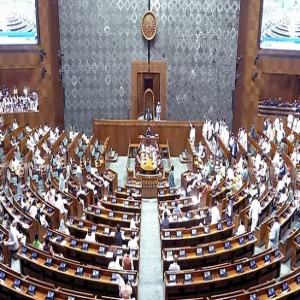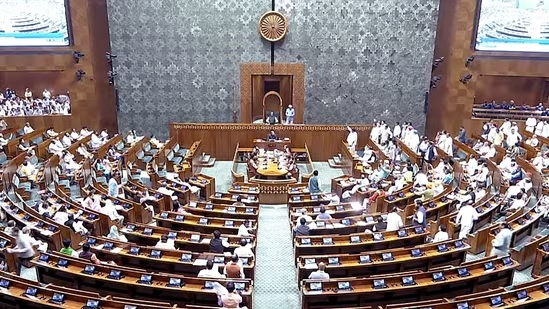
.png) Jacob Peenikaparambil
Jacob Peenikaparambil

Despite the depleted numbers of the BJP in the Lok Sabha after the recent Lok Sabha election, the party appears to be more aggressive than it was earlier. After a substantial increase in their number, the opposition parties are also in an aggressive mood. Belligerence on both sides is reflected in the Lok Sabha debates and the statements of the leaders of both sides. However, the BJP under PM Modi, which dreams of a Congress Mukt Bharat, has bulldozed the parliament during the last ten years, and it is not in the mood to reconcile with a resurgent opposition.
The parliament sessions are marked by continuous interruptions, howling, and slogan shouting. Rather than discussing the pros and cons of issues affecting people, the MPs indulge in name-calling and tactics to put down each other. The media, especially TV channels, are flooded with spokespersons of political parties abusing each other. "There is almost no democratic country in which so much venom is spat at each other by TV spokespersons of political parties. It is only because we have not become a mature democracy", wrote Tavleen Singh on July 28, 2024, in The Indian Express.
Boycott of the Niti Aayog meeting by nine opposition chief ministers and the West Bengal Chief Minister Mamta Banerjee walkout was another flash point in the politics of confrontation. After her exit from the meeting, Mamta Banerjee told reporters that the chief ministers of Andhra Pradesh, Chhattisgarh, Assam, and Goa were allowed to speak for 10-12 minutes but she was stopped within five minutes.
"I said that you have deprived us in the Budget and stopped all developmental schemes for Bengal. For the last three years the 100-day work in Bengal has been stopped, Pradhan Mantri Aawas Yojana has been stopped…everything has been stopped including food subsidies. We are due Rs 1.71 lakh crore in central government funds till last year. In this Budget also we have not got anything, only zero. I only said this much and they switched off my mic," she said.
One serious complaint of the opposition-ruled states is that they are discriminated against in the allocation of financial resources. The approach of the BJP government at the centre towards the opposition-ruled states has been one of confrontation. The governors in these states are being used as the agents of the central government to disturb and meddle with the process of governance. Governors of Kerala and West Bengal have not given assent to the bills passed by the state legislature for months. Both states have approached the Supreme Court on this issue. In response to the pleas, the top court issued notices to the Union Ministry of Home Affairs and the secretaries of Kerala Governor Mohammad Arif Khan and his West Bengal counterpart CV Ananda Bose and sought their replies within three weeks.
The elected representatives - MPs and MLAs, of all political parties have to be aware that the ruling party and the Opposition have to play their respective roles if democracy is to be vibrant and strong. A robust Opposition that points out the failures and deficiencies of the government is essential to improve the quality of governance. In the absence of a vibrant Opposition, the ruling party can become either lethargic or dictatorial. The Opposition's role is also to make the government accountable to the people who have elected the government.
If a political party wants an Opposition-mukt Bharat, it aims to be a dictator. As the BJP's ultimate goal is to transform India into a Hindu Rashtra, electoral democracy for them is only a means to capture power and remain in power. That is why the BJP is always in an election mode. The prime and home ministers are also in election gear throughout the year.
Against the backdrop of the setback the BJP had in the Lok Sabha election, it has to give up the plan to change the Constitution. It has to accept the Constitution of India, especially its core values, including secularism. Through the Lok Sabha election 2024, the people of India have unambiguously told the BJP that they are not prepared to accept the vision of the BJP for India - a Hindu Rashtra. India has been a country of pluralism for millennia, and unity in diversity is in the DNA of India. India cannot be converted into a theocratic state like Pakistan, Saudi Arabia and Afghanistan.
If the BJP has to become a secular democratic party, the RSS has to give up its stranglehold on the BJP. Since its inception, the RSS has claimed to be a cultural organisation. It has to prove the veracity of the claim by giving up its political aim of converting India into a theocratic state. It has to limit its activities to promoting Indian culture, including the core values of Hinduism. It should direct its affiliated organisations to desist from perpetrating violence on minorities under the guise of protecting the Hindu religion.
Besides the two ideological and structural changes mentioned above, PM Modi and his party need to respect the Opposition by allowing it to play the role envisaged by the Constitution of India. Instead of rushing bills in the parliament, they are to be discussed thoroughly, allowing the people of India to give their feedback. Important bills are to be referred to the parliamentary committees for detailed study. The speaker and the chairman of the Rajya Sabha have to be impartial in performing their constitutional duties, and the post of the deputy speaker of the Lok Sabha is to be given to the Opposition, respecting the long parliamentary tradition.
Secondly, the BJP government must stop the misuse of investigation agencies against opposition leaders, academicians and social activists.
Thirdly, the BJP central government has to advise its chief ministers to say goodbye to the unconstitutional bulldozer justice invented by a BJP chief minister and blindly copied by other BJP chief ministers. Similarly, the rule of law is to be firmly implemented throughout India by strictly prohibiting any organisation from taking law into its hands, especially the militant organisations of the Sangh Parivar.
Fourthly, PM Modi and Amit Shah have to present themselves as role models for giving up hate speech and instruct all Ministers, MLAs, MPs and other party functionaries to desist from hate speech and spreading hate messages against minorities.
The opposition parties, particularly the Congress, also will have to give up their confrontational approach. They have to propose alternative policies while criticising the government's wrong policies. For example, in their speeches, the opposition leaders were highly critical of the Budget presented by Finance Minister Nirmala Sitaraman. At the same time, not many alternative proposals came from the opposition benches. Doubling the allocation for Medium, Small, and Micro Enterprises (MSMEs) could have been an alternative proposal to create a large number of jobs. They should have pointed out the specific drawbacks of the schemes proposed by the finance minister for generating employment and suggested remedies.
All members need to maintain discipline during the proceedings of the parliament, avoid shouting at the members who speak, avoid unwarranted interventions while someone is speaking, etc., and the opposition members have to become role models in these aspects.
Opposition members have a right and a duty to be critical of the wrong and defective policies and actions of the government. However, personal attacks on the prime minister and other ministers will not bring any dividends in the long run for the opposition parties. Personal attacks on Rahul Gandhi by the PM and the BJP leaders proved harmful to the BJP in the last Lok Sabha election. Avoiding personal attacks and focusing on the criticism of the policies and actions of the government with reasoning will enhance the people's appreciation of the opposition leaders.
Undiluted commitment to secularism on the part of the opposition parties will increase the people's support of them. Some Congress leaders like Kamal Nath, former chief minister of MP, sometimes promoted soft Hindutva as a political strategy to win over Hindu votes. The soft Hindutva strategy of Kamal Nath proved to be disastrous, as the Congress was routed in the assembly elections in November 2023 and could not win a single Lok Sabha seat. This kind of approach by the opposition parties will only destroy their credibility before the people of India.
Many people may think that the proposals for change are daydreams or illusions. But nothing is impossible in this world. No ideologies are permanent. They change according to the demands of the time. The BJP becoming a secular democratic party is not an impossibility. If the BJP becomes a centre-right secular democratic party and the Congress remains a centrist party, Indian democracy will have a golden future. The enmity between these two parties will only be harmful to the nation. Both sides must be ready for change, but the BJP, being the ruling party, must initiate it.